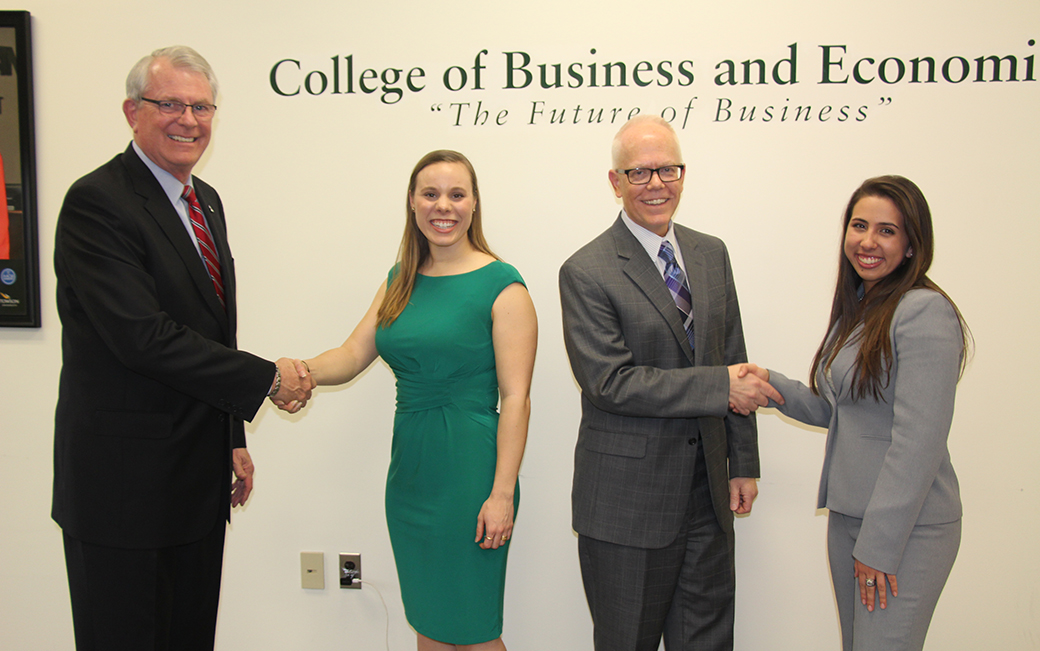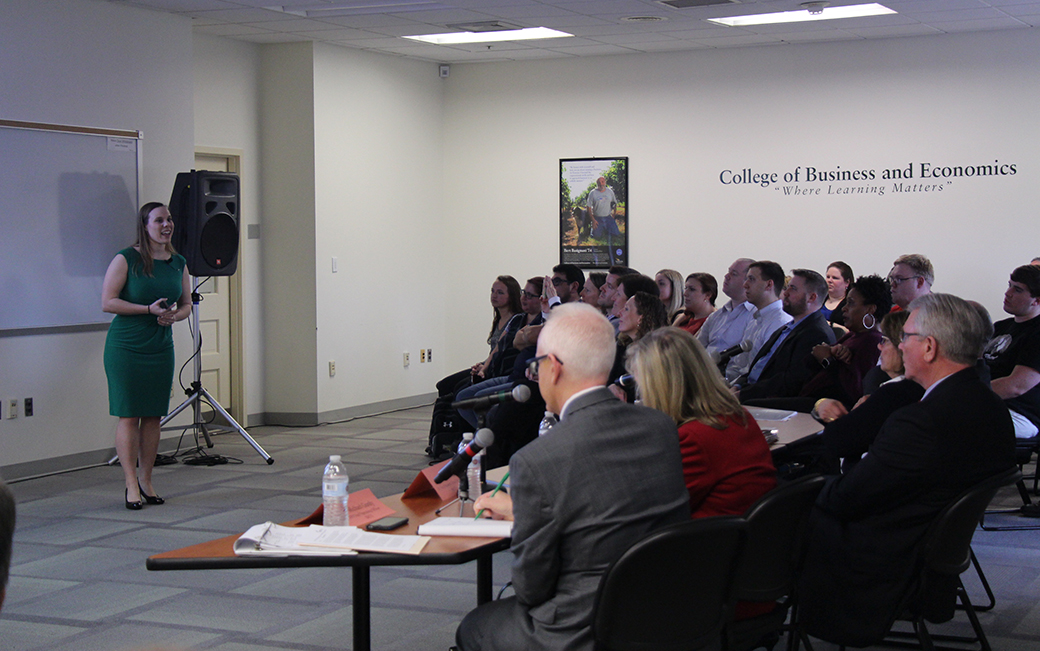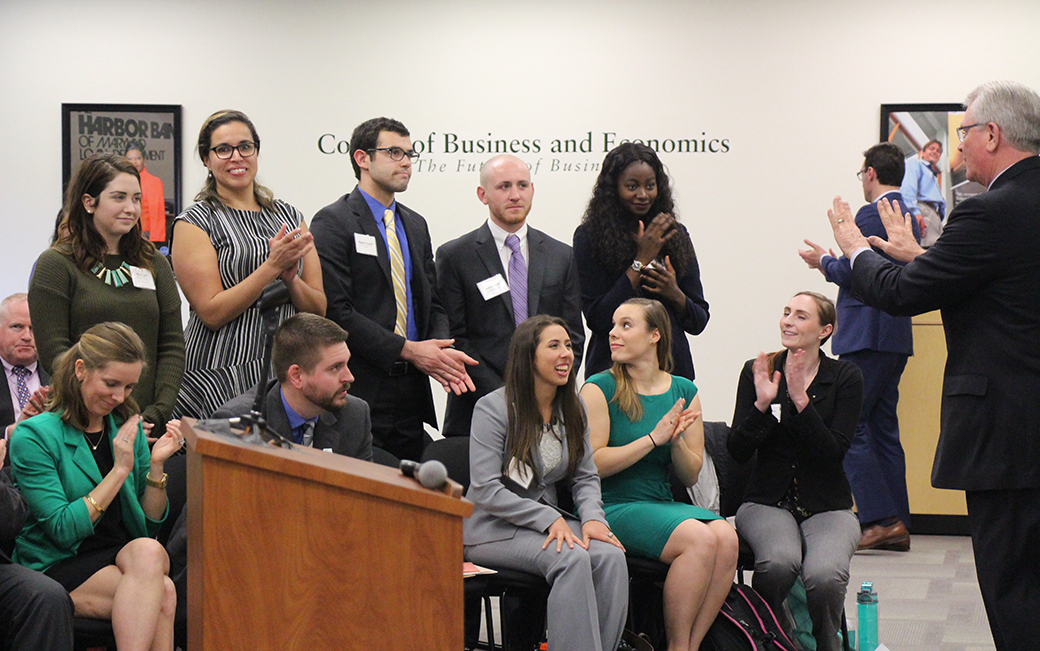
2017 winners of “The Associate” are workforce ready
Jullyenne Antunes ’17 and Lillian Hulbert ’17 have great answers for when they are asked “What are you going to do after graduation?”
By Megan Bradshaw on May 12, 2017
TU seniors Jullyenne Antunes and Lillian Hulbert have great answers for when they are asked, “What are you going to do after graduation?”
The soon-to-be alumnae won the 2017 edition of the College of Business and Economics’ annual competition, “The Associate.”
Find out about each winner’s competition experiences in the Q&A below.
What made you want to enter “The Associate”?
Jullyenne Antunes (JA): During my first year at Towson University, I heard about the competition and it intrigued me from the start. As I progressed as a business student, each May I had my professors remind me when the competition was being held. Last semester, I had the honor to be recommended to enter the competition by a former marketing professor, Dr. Thomas. It was her recommendation that led me to go to an informational meeting where I was able to talk to past alumni who participated in the competition. After hearing such wonderful remarks and learning how their careers were built up from experience in this competition I knew I had to enter!
Lillian Hulbert (LH): I wanted to grow as a business student, network, improve my presentation skills and receive critiques from executives before I enter the work force. I had competed in other case competitions in the fall and really enjoyed them. So I knew I would enjoy the challenge of “The Associate.” However, I was on the fence about it once I was accepted. This semester I’m taking seven classes and interning. I wasn’t sure if I would be able to handle everything, but after I talked to Will Newman (last year’s winner) about his experiences I knew it would be worth it.
Do you have any prior experience with this type of competition or the projects you had to complete for each case?
JA: Prior to this competition, I had only participated in one case study competition. As part of being enrolled in Management 481 Strategic Management last semester, each section was to conduct a case study for Cintas Corporation. We were to present our recommendations to our specific class sections, and the top groups from each section would present to the executives of Cintas. The winning group had the opportunity to earn extra credit in the course and the possibility of being able to work for the corporation. In my section, my group did not make it into the final round to present to the Cintas executives.
LH: Yes, I competed in three case competitions in the fall. I won the CBE sales competition, placed second in TU’s marketing intelligence competition and competed in Johns Hopkins’ sports marketing competition. I think these case competitions exposed me to what “The Associate” would be like and, ultimately, gave me an edge. I came into the competition knowing what it would be like to present to a panel of industry professionals and the quality of work they would be expecting.
How did it feel to pitch your ideas to the companies?
JA: It was honestly very nerve-wracking but also extremely exciting. It is always a difficult task to present any idea to others, as you do not know what reaction or feedback you will receive. That vulnerability when pitching an idea was the most nerve-wracking part of this competition. When we received positive feedback from a company that really liked an idea or agreed that what we recommended could be the solution they were seeking, that was the most rewarding feeling. I am so thankful that the ideas that my team presented throughout this competition were taken very seriously and have the potential of being implemented in the future.
LH: I would describe it as exciting, nerve-wracking, and fun. Personally, I like presenting and had a positive experience. It was a thrilling challenge, but it felt vulnerable at times. Each week we would pour ourselves into the cases and never know if our solution was good enough or what questions they would ask. Going into the presentations we had to be as prepared as possible.
What were the easiest and toughest cases for you?
JA: Overall, this competition provided cases that really challenged all of us. Looking at specific cases, I would say the most difficult case for me was the Week 3 case for Pandora Jewelry because of the level of creativity, research, and time needed to provide the deliverables wanted. As a team we had to brainstorm and create a marketing plan for events that corresponded with a new product launch. This meant that all of the logistics that go into hosting an event in different types of stores had to be considered, as well as the best way to market the event idea to existing and new customers. As difficult as this case was, it was also the most fun because it pushed us as a team to provide something Pandora had never seen before. I am very proud that for this case I was able to be the team lead and that our team recommendations were selected as the winner that week.
The easiest case in my opinion was the Week 4 case with Splash Supply Co. because as a team we were able to think of our recommendation the fastest. We were asked to figure out the best way to attract new customers to their store in York, Pennsylvania, by looking at previous marketing initiatives. We decided revamping their current website would be the best recommendation. The ease of this case also came from it being our fourth case as a team where we knew how to delegate tasks and how each person's strengths could be utilized.
LH: It’s hard to say which one was the easiest or the toughest because all of them were so different, and there were difficult and easier aspects to each case. Some of the cases brought up issues that I’ve never had to think about as a marketing student.
However, overall I’d say the TEKsystems case was the easiest for me and the SECU case was the most challenging. I was very familiar with TEKsystems. I have several friends who are recruiters, and I was familiar with their process. I talked to several of my friends, and they coached me on how to prepare for the live cold call.
The most challenging case was the final SECU case. Why? I had to do it alone. After working with a team on every case for the last five weeks, I felt naked trying to decide what to do all by myself. I was used to bouncing ideas off of others, hearing my teammates’ perspectives and discussing the case with professors. Since it was spring break, I couldn’t do a lot of the required research for the case or just walk into one of my professor’s offices to ask them questions.
Did you suspect you’d both be chosen?
JA: I was in complete shock that we were both chosen! I never knew that choosing two winners was an option in this competition (I now know that this is the third time there has been more than one winner.). I felt that the final decision was going to be very tough, as we had very different approaches and presentations to the final case. I started to piece the results together when I heard Rod say, "Here's what were going to do..." Still in shock, but very happy with the result!
LH: No, not until the presiding judge was about to announce the winner, and he talked about how hard it was to make a decision and said, “So this is what we’re gonna do.” When he said that I knew he was going to offer both of us jobs. He normally gets right to the point and will say which person is “going home,” so when he start off by saying how well we both had done, I became suspicious.
How do you think this experience will help you adjust to having your first real job?
JA: Due to this competition, I have been able to receive real "boardroom" experience. I have interacted with executives in a setting where I had to think on my feet and be able to answer tough questions. Having had this experience will give confidence when facing meetings and interactions with other top executives of a company. I have also learned how to better work as a team. This comes with listening and evaluating others' ideas and being able to rely on the strengths of others rather than solely on yourself! The beauty of having different cases each week was that it made each one of us alter our viewpoints to match the situation at hand. Being able to adapt to what is given to you is exactly what happens in the workforce everyday. I strongly believe that each one of us who competed in this program will be taking on valuable experiences that have made us prepared to take on the "real world" with much more confidence!
LH: I think this experience will help me transition well into the workforce, especially if I choose to take SECU’s offer. I gained so much by competing in “The Associate.” I developed many transferable skills, like presenting individually and as a team, answering tough questions on the spot from executives, thinking critically about business problems, and valuing research over my opinion. I got clarity on my strengths and how I like to operate in a team. I’ve taken many strengths and personality test before, but through “The Associate” I saw my strengths come to life.
Related - Towson seniors win jobs at SECU through university competition (Daily Record)

